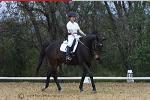Cardinal Points Farm logo and banner
Teaching Approach and Philosophy


It is common to think that if we can stay on a horse and not fall off, we know how to ride. The truth is, in order to become an effective rider, you must first be a good horseperson. What may surprise some people is that being a good horseperson may not involve any riding at all. Sometimes it's as basic as knowing how to teach a horse to lead, to put its head down for bridling, or to load in a trailer.
A good horseperson regards and treats their horse as a partner, and not a piece of equipment. Moral arguments aside, there is a very practical reason why you may want to take this approach.
Horses typically outweigh people by a thousand pounds or more. You cannot physically force a horse to do anything it doesn't want to do, without resorting to inhumane and counterproductive methods. Whether you want to succeed in the show ring, enjoy a hack in the country, or safely manage horse behavior in and out of the stall, you absolutely need the horse's cooperation. Not just this one time, but the next time, and the time after that.
To do this, you must first allow that a horse is an intelligent being, capable of learning and communicating with other species. Then you must learn ways to open a two-way channel for communication, and encourage the horse to use this same channel. Only then can you hope to enlist the horse's cooperation to work towards the same goals you have for this partnership.
Whatever your level of experience, we will show you how to build a relationship with your horse. You can be assured of continually discovering new things, and have the tremendous gratification of reaching milestones you have never thought possible.
A good horseperson regards and treats their horse as a partner, and not a piece of equipment. Moral arguments aside, there is a very practical reason why you may want to take this approach.
Horses typically outweigh people by a thousand pounds or more. You cannot physically force a horse to do anything it doesn't want to do, without resorting to inhumane and counterproductive methods. Whether you want to succeed in the show ring, enjoy a hack in the country, or safely manage horse behavior in and out of the stall, you absolutely need the horse's cooperation. Not just this one time, but the next time, and the time after that.
To do this, you must first allow that a horse is an intelligent being, capable of learning and communicating with other species. Then you must learn ways to open a two-way channel for communication, and encourage the horse to use this same channel. Only then can you hope to enlist the horse's cooperation to work towards the same goals you have for this partnership.
Whatever your level of experience, we will show you how to build a relationship with your horse. You can be assured of continually discovering new things, and have the tremendous gratification of reaching milestones you have never thought possible.




Lessons
Copyright © 2007-2012 Cardinal Points Farm
For questions or comments about this website, send mail to: Webmaster@CardinalPointsFarm.com
For questions or comments about this website, send mail to: Webmaster@CardinalPointsFarm.com
































